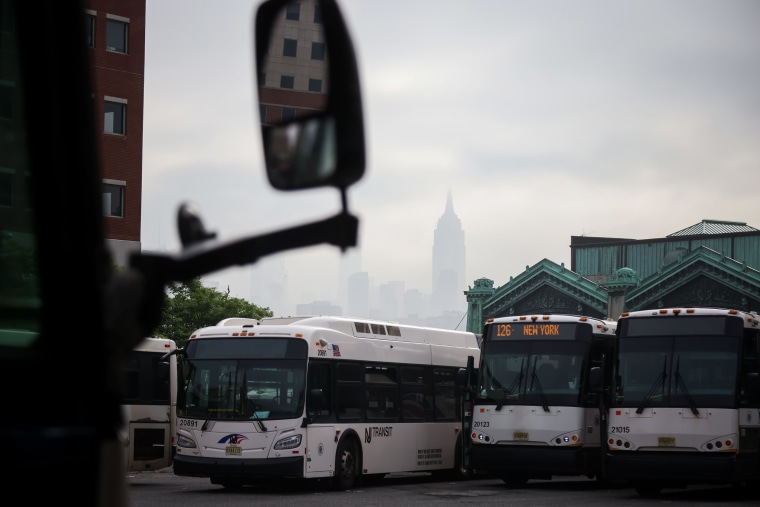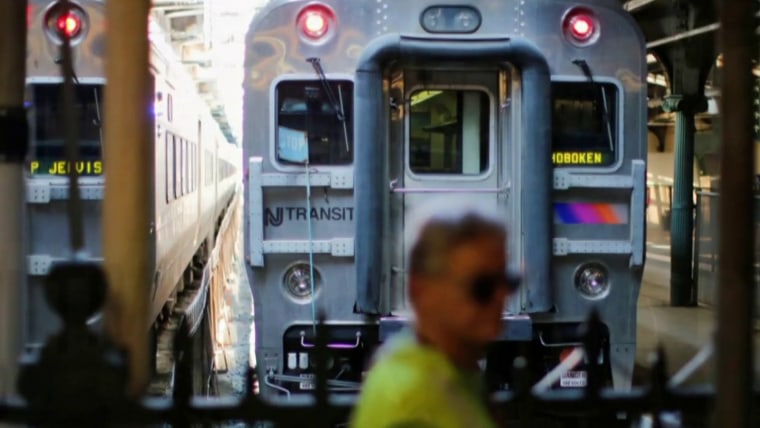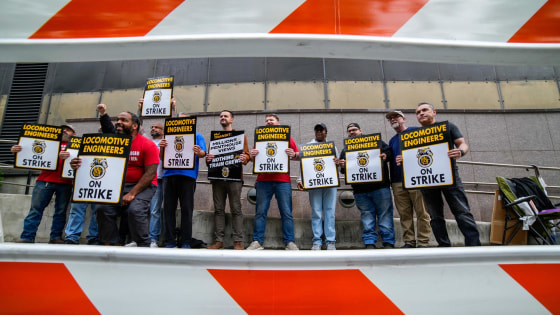The New Jersey Transit strike has entered its second day as both transit and union officials met Saturday afternoon in hopes of resolving disputes that have crippled a system that nearly 100,000 commuters rely on for transportation, officials said.
The meeting, which went on for over two hours, ended with both sides agreeing to continue negotiations on Sunday.
Members of the railroad engineers union for New Jersey Transit went on strike at 12:01 a.m. Friday. The system serves a total of 350,000 riders who may also feel the strike's impacts.
The Brotherhood of Locomotive Engineers and Trainmen (BLET) said that its 450 members in NJ Transit walked off the job right after midnight in a dispute over pay, bringing the nation's third-largest transit system to a standstill.
Around an hour before that deadline, Gov. Phil Murphy and NJ Transit President Kris Kolluri told reporters that they wanted a fair deal for the union. But they also said that they could not agree to a preferential deal that would cause the other unions in the transit system to demand the same, which Murphy said would cost hundreds of millions of dollars.
In a statement issued Friday evening, BLET said they reached out to NJ Transit to resume negotiations but had not heard back.
Kolluri said in a news briefing Saturday that he intended to meet with representatives of BLET along with Murphy to discuss potentially reaching a deal and ending the strike, reiterating that their goal is "a fair deal that will not break the bank."
"That is our principle, we are not moving from that," Kolluri said about the position he shared with Murphy. "And I hope the union understands that that is where we are, and that is where we will be. Ultimately, fair wages is their position, which I respect, not breaking the bank is our position, that they should respect."
NJ Transit and BLET will meet again on Sunday. The National Mediation Board will also attend the meeting.

This has been the same position Kolluri and Murphy maintained on Friday, including in a news briefing where they said they were ready to negotiate with BLET "to reach a fair and affordable deal as soon as humanly possible," without raising costs on commuters and taxpayers.
"We are ready to restart negotiations literally this second," Murphy said on Friday. "But we need the BLET to come back to the negotiating table in good faith. Our doors are open, they will remain open."
Murphy said that Kolluri and BLET representatives shook hands in March on a deal that would give NJ Transit locomotive engineers almost the same hourly wage as Long Island Railroad engineers.
"But now, just a couple of months later, a small handful of locomotive engineers have walked off the job and shut down our entire transit system," Murphy said, adding that it is "a mess of their own making" and "a slap in the face of every commuter and worker who relies on NJ Transit."
"What the people of New Jersey need right now is for the members of the BLET to step up and meet their obligations to the public," he said.
Commuter Julia Slaby, who lives in Lyndhurst, New Jersey, relies on the NJ transit system to get to Manhattan for school. When the trains were suspended Friday morning, she had to find an alternate route to attend her last day of classes.

"I figured out that I could just drive 40 mins to Hoboken to take the PATH train, which is not the greatest, but I have to go to school," Slaby said, adding that "it's finals season."
Daniela Villegas, who commutes to Hoboken, said the strike has extended her trip by around 40 minutes.
Villegas said she was "very worried" about this strike potentially going on for a long time.
NJ Transit “is facing a sobering fiscal reality," Murphy said.
The union cited low pay as a top issue.
A locomotive engineer who was on the picket line Friday said he was there to protest for similar pay to Amtrak and Long Island Railroad engineers.
"A lot of our guys could go across the platform and make 10, 12 dollars more an hour," said the engineer, who would not give NBC News his name per BLET's rules.
Ultimately, he wants to get back to work and serve the commuters he's come to know, he said.
"We’d rather be running trains, we’d rather be working," he said. "And believe me when I tell you, all of us, in some way, form or another, we feel that pain."
It said that its members at NJ Transit are the lowest-paid locomotive engineers of any major passenger railroads in the country.
“They have gone without a raise for six years and have been seeking a new contract since October 2019,” the union said.
On CNBC’s “Power Lunch” Friday afternoon, Kolluri said a deal is possible and that his administration will work hard throughout the weekend to get one, but reiterated that the union's proposal is not fiscally achievable without raising fares for commuters.
"So for us, for me and Governor Murphy, that’s a line in the sand that we just cannot cross," he said.
NJ Transit said that the strike could affect around 100,000 people per day, and MetLife Stadium this week warned that there would be no NJ Transit bus or rail service for Shakira concerts Friday.
The union said that the transit agency has millions to spend on a new headquarters in Newark and gave up millions in a fare holiday last year.
"They have money for penthouse views and pet projects, just not for their front-line workers," BLET National President Mark Wallace said in a statement. "Enough is enough. We will stay out until our members receive the fair pay that they deserve.”
Murphy and Kolluri urged people able to work from home Friday to do so, and said there would be extra bus service and additional park-and-ride areas.
Amtrak and PATH trains, and buses are still running.
The last time there was a strike at NJ Transit was in 1983, more than 40 years ago.
Hoboken Mayor Ravinder S. Bhalla said in a statement on X early Friday that it was "a deeply frustrating moment for Hoboken and the region."
"NJ Transit and BLET had months to reach an agreement and prevent this disruption, which now impacts hundreds of thousands of commuters and residents," he said, while urging people to allow extra time for what are sure to be congested journeys.
Newark Mayor Ras Baraka said the strike was "precipitated" by NJ Transit, and makes it clear that the system needs to restructure its funding model.
"It’s time New Jersey shifts toward reimagining our transportation system away from a conduit between major metropolitan destinations and focuses clearly on the increasing ridership of residents in our own cities for their daily needs to live, work and play," Baraka said in a statement Friday.


